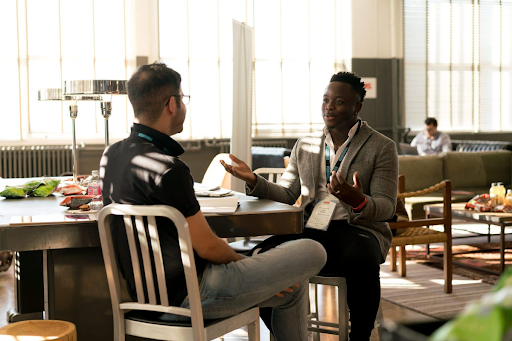Finding Acting Mentors and Role Models
Contents
ToggleNo matter what career path you choose in life, having a mentor or role model to guide you can be incredibly beneficial. This is especially true for actors.
In an industry that can be challenging to navigate with extreme highs and lows, lulls and intensely busy periods, having someone to look to for advice is priceless.
While these relationships between mentor and mentee sometimes occur organically, on occasion, it is necessary to engineer them.
If you’re an actor seeking to find a trusted mentor or role model to connect with on your journey here are some tips to help you on your way.
Mentor vs. Role Model – What Is The Difference?
In simple terms, a role model is someone you aspire to be like, whereas a mentor guides or teaches you about how to become the best version of yourself.
Quite often, the two intersect, meaning that your mentor is also your role model and vice versa.
As a mentor or role model, they freely share their professional advice and experience with a less-experienced person. The goal being to help others share in their success.
Why Seek Out A Mentor Or Role Model?
There are many benefits to having a role model and mentor in your life.
When we have a role model that we aspire to be like, we are motivated to set goals and strive to mirror the success modelled to us by that individual.
Through mentoring, we receive the encouragement, support and practical guidance necessary to achieve those goals and the associated success.
When, as actors, we have a role model and mentor who is experienced in our industry, this can go a long way towards helping us navigate the more challenging times and overcome them.
Knowing there is someone you admire who has first-hand experience and can go to for advice, or look to as an example of what can be achieved, is both incredibly reassuring and motivating.
What Does A Mentor/Role Model Do?
Aside from motivating and guiding you to be your best, a mentor and role model can also help you:
- Expand your network and connect with other industry experts
- Find and audition for roles that may not yet be publicly posted
- Gain employment within the industry
- Prepare for auditions and booked roles
- Be more aware of other opportunities for growth in your career
- Realise your potential
- Avoid making mistakes based on their own experiences
As an actor, a role model or mentor provides a stabling influence and is a key ingredient for continued growth and success.
How To Find An Acting Mentor Or Role Model
Unfortunately, finding a mentor isn’t as simple as simply choosing someone you like and asking them to take you on.
Firstly, you need to be desirable as a mentee and demonstrate perseverance, dedication, professionalism and other winning traits. We’ll look more closely at this further on.
You’ll also need to understand how to delicately leverage social connections, network with higher-tier professionals and use all available tools to your advantage.
This may mean:
Using Social Media
Follow people you admire online and pay attention to what they share and like. Find out if you share common interests and initiate simple interactions to begin with.
Build on this over time before broaching the subject of mentoring. If you bombard them as a complete stranger right off the bat you’re unlikely to have success.
Look Beyond Your Immediate Connections
One of the goals of finding a mentor is to connect with someone who is ahead of you in the industry. In most instances, this means you’ll need to look further afield than friends or friends of friends to make valuable new connections.
Having said that, try to reach out to someone who is still accessible. A headlining star like Chris Hemsworth for example is going to either not respond or have zero time to spend with you due to their demanding schedules.
Connect With Your Coaches
If you regularly attend acting classes, which we highly recommend, it can be helpful to chat with your acting coach about mentorship. Many acting schools will have a program in place for this and can connect you with individuals ready and willing to mentor a less experienced actor.
Even if they do not have a program for this, they are already connected enough to give good guidance on who might be open to this. They can also provide feedback on how to best prepare yourself as a mentee.
Stand Out.
Check our term dates, and enrol in classes today.
Attend Industry Events
As always, rubbing shoulders with a mix of industry professionals at events is a fantastic way to meet people and form more natural connections.
You should try to attend a mix of film festival events, Q&A panels, screenings, educational workshops, premieres or similar.
Get Reading
If you’re struggling to connect with a potential mentor in person, try reading their biography if they have one. You can learn a lot from biographies, they’re a front-row seat from which you can watch your mentor overcome mistakes, generate success and pursue greatness.
Identify Your Uniqueness
Make sure you are an interesting candidate for a potential mentor. Most mentors want to see value in their decision to take you under their wing.
Think about what makes you unique and marketable and make sure your mentor can see this in you too!

How To Be A Mentee Worth Mentoring
The success of a mentor is closely tied to the type of mentee they take on. This symbiotic partnership relies on the cultivation of a relationship that is open and trusting, one that you both benefit from.
As a mentee, if you are close-minded, lack enthusiasm, curiosity or a willingness to learn with gratitude, the entire experience is wasted.
You should:
Ask Questions
Asking questions shows you value what your mentor has to offer. While we don’t suggest firing questions at them non-stop, they are encouraged.
Be sure to fully listen to your mentor’s answer before asking additional questions and keep the questions polite and on topic.
Welcome Coaching
You are not always going to agree with everything your mentor has to say, which is fine. However, this does not mean you should shut the conversation down or start an argument.
Try to remain open to new ways of thinking and show respect for the fact that your mentor is taking the time to teach you. Remember, they don’t have to mentor you and if you consistently push back, why would they want to?
Show Enthusiasm
This doesn’t translate to sitting and staring at them in raptures with a giant smile every time they talk.
What we mean by this is that you should welcome opportunities to catch up, actively pursue continued learning, show up on time and if given any homework, do it on time and to a high standard.
If your mentor feels like they have to drag you through things or struggles to get you to meet up, they’re not going to feel that it is a worthwhile endeavour.
Be Thankful
As in all things, gratitude goes a long way. Your mentor is selflessly giving up their time to invest in you and your future.
Be sure to show adequate thanks and behave in a way that demonstrates your gratitude for their willingness to help you.
Return In Kind
Mentees typically get more out of the relationship than mentors. However, that doesn’t mean mentors aren’t also deserving of getting something back.
Remember, everything isn’t always about you. Showing care and interest in your mentor is also important. Mentorship is deeply personal in nature for both parties and relies on trust, openness and discretion to thrive.
Remember They’re Human
Don’t put your mentor on a pedestal. This places unfair pressure on them and can create difficulties in mentoring you. They’re human, just like you and have made and will continue to make mistakes in life.
Give them grace and interact with them in a way that shows you value who they truly are as a person not as a name you can drop.
What If My Chosen Mentor Says No?
So you’ve done the work to prepare yourself and laid the groundwork with a chosen mentor but when it comes to the crunch, they decline to mentor you. What now?
As hard as it is, don’t take it personally. Your mentor could have many reasons for saying no and it may have nothing to do with you.
They may not feel they have time for you, they could feel they’re not suited to being a mentor or maybe they don’t feel the right connection with you.
Just as with an audition, take a moment to reflect and then dust yourself off and try again with someone else you admire. As with all things in this industry, persistence is key!
The Actors Pulse – Supporting You At Every Stage
If you’re ready to find a mentor and have no idea how to begin or need guidance, the team at The Actors Pulse are here to help.
As the leading school for the Meisner Technique in the Southern Hemisphere, we have a wealth of industry connections.
Our decades of experience as coaches and mentors have helped to shape the futures of several well-known actors. We’re here to do the same for you.
To learn more, contact The Actors Pulse today at 0414 475 515.

Billy Milionis is one of the few Australians to have ever studied under the legendary master teacher, the late Sanford Meisner. Billy has also studied story structure and scene analysis techniques with John Truby and later at UCLA. He has also spent several years doing improvisation in Hollywood with the L.A. Connection. In addition, he trained in the technique of Stella Adler, Practical Aesthetics and Lee Strasberg’s method.





